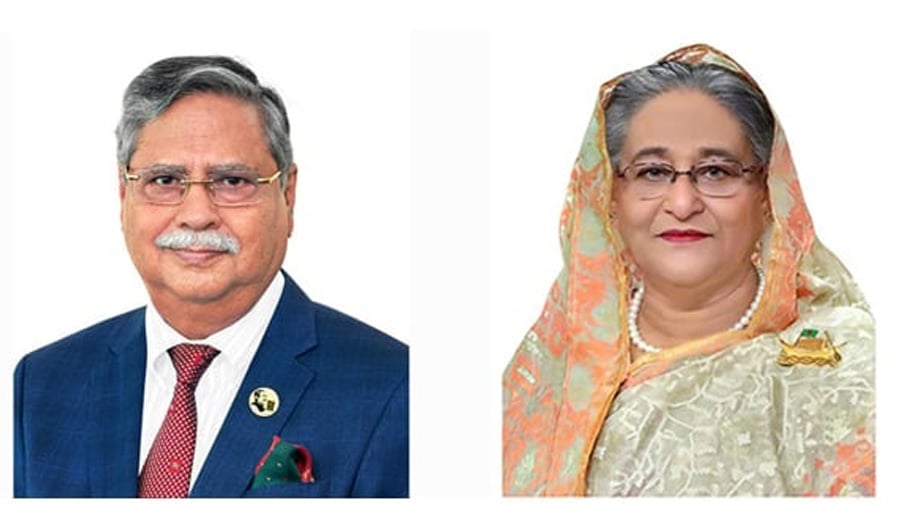
DHAKA, June 6, 2024 (BSS) - The historic Six-Point Day, marking the demand for autonomy for the then East Pakistan, now Bangladesh, will be observed tomorrow across the country in a befitting manner.
Different socio-political organisations, including ruling Awami League, its associate bodies and like-minded socio-cultural organisations, have taken elaborate programmes to observe the day.
On June 7 in 1966, the Father of the Nation Bangabandhu Sheikh Mujibur Rahman launched a massive movement against the misrule of the Pakistanis on the basis of the 6-point demand, the Magna Carta of the Bangalees, seeking autonomy for the then East Pakistan.
Eleven people, including Manu Mian, Shafique and Shamsul Haque, were gunned down by the police and paramilitary EPR on June 7, 1966 in Dhaka and Narayanganj during a hartal called for the release of Bangabandhu and other leaders detained for launching the Six-Point Movement against the then barbaric ruling clique.
Bangabandhu Sheikh Mujibur Rahman launched his historic six-point political and economic programme in Lahore on February 5 in 1966, aiming at attaining greater autonomy for the then East Pakistan in the backdrop of exploitation and discrimination by the then Pakistani rulers.
The six demands were creating provision in the constitution for a Federation of Pakistan in its true sense based on the Lahore Resolution, the federal government will deal with only two subjects: Defence and Foreign Affairs, introduction of two separate but freely convertible currencies for East and West Pakistan, vesting the power of taxation and revenue collection with the federating units, maintaining two separate accounts for the foreign exchange earnings of the two wings and creation of a separate militia or paramilitary force for East Pakistan.
President Mohammed Shahabuddin and Prime Minister Sheikh Hasina issued separate messages on the eve of the Six-Point Day.
In his message, President Shahabuddin paid rich tributes to the memories of the Father of the Nation Bangabandhu Sheikh Mujibur Rahman and all who embraced martyrdom for implementing the six-point demand.
Terming the historic six-point demand as the milestone in the country's long struggle for independence, he said the independence of the Bangalee nation is the outcome of a long struggle.
The President said the movement, which was initiated in 1948 with the demand for recognition of Bangla as a state language, had successfully culminated through the 1952 Language Movement creating the foundation of Bangalee nationalism.
Later, Bangabandhu placed the historic six-point demand in Lahore in 1966 for autonomy of Bangalee nation in continuation of formation of Juktofront in 1954, movement against autocratic rule in 1958 and 1962 anti-Education Commission movement, he said.
Through the six-point demand, Shahabuddin said, Bangabandhu presented political, economic, social and cultural interests, including along with administrative structure, powers of the central government, monetary policy, revenue and tax policy, foreign trade and the formation of regional forces, of East Bengal.
The President said the six-point demand contained the framework of independence and autonomy of Bangalee nation.
After the announcement of six-point demand, he said, the Pakistani rulers tortured Bangabandhu inhumanly and repeatedly arrested him, but could not deter him from the six-point demand.
The historic six-point is not only the charter for emancipation of Bangalees rather it is the source of inspiration for movement for emancipation of the repressed and persecuted people all over the world, the President added.
"I believe that the young generation will be inspired with patriotism by learning from Bangabandhu's six-point demand," Shahabuddin said and urged all to fulfill Bangabandhu's dream of building a happy and prosperous 'Sonar Bangla' free from hunger and poverty.
Prime Minister Sheikh Hasina, in her message, paid glowing tributes to the memories of all martyrs of the struggle for independence including those of the June 7 and said that the historic June 7 is an unforgettable and significant day in the history of Bangladesh.
"The historic movement for six-point demand, declared by the greatest Bengali of all time, Father of the Nation Bangabandhu Sheikh Mujibur Rahman, got a new dimension on June 7, 1966," she said.
The premier said police and the then EPR had opened fire on unarmed people during the observance of hartal, called by Awami League to realize the six-point demand, the charter of freedom of the Bangalee nation.
Eleven people including Manu Mian, Shafique and Shamsul Haque in Dhaka and Narayanganj had embraced martyrdom on that day, Sheikh Hasina added.
The present government is firmly committed to keep intact the democratic rights of the people imbued with the spirit of all democratic movements and struggles, including the historic June 7, she said, adding: "We are taking the country forward with the spirit of the Liberation War. We are working to reach the benefits of independence to all people of the country".
In last 15 years, the government has made unprecedented development in the country, she said, adding that Bangladesh has now gained the status of developing country from least developed country (LDC).
She urged all to be motivated by the spirit of the great liberation war to face any conspiracy and to protect the continuity of the country's development and democracy.
She hoped that with the united efforts of all, a developed-prosperous and modern-smart ‘Sonar Bangladesh’ as dreamt by the father of the nation will be built by 2041.
Both the president and the premier wished all the programmes undertaken on the occasion of the 'Historic Six-Point Day' a success.